Ram started the half-ton diesel craze back in 2013 when it announced the Ram 1500 EcoDiesel. Since then, the brand lost ground to legal issues related to emissions and stiff competition from Ford and Chevy. But now Ram is back in the game with a new diesel engine for its latest “DT” generation truck, and after testing it, I can tell you: This might be the engine to get.
(Full Disclosure: Ram flew me to Duluth, Minnesota, fed me lots of barbecue, and put me up in a hotel right on the shore of Lake Superior. Also, I formerly worked for Fiat Chrysler, though never on a Ram program).
The Ram EcoDiesel received accolades after it hit the market in early 2014 having scored the “Best MPG Of Any Half-Ton Pickup Ever.” In 2015, I used one to tow my heavy Jeep J10 over the Appalachians, and it was fantastic.
But since then, the 240 horsepower, 420 lb-ft truck has fallen from grace a bit, with Ford debuting a 250 horsepower, 440 lb-ft diesel at the 2017 Detroit Auto Show, and Chevy showing a 277 horsepower, 460 lb-ft diesel the following year.
Both the Ford and Chevy offer better fuel economy than the last-gen Ram, with the Blue Oval’s truck promising as high as 30 mpg highway and the Chevy offering up to an incredible 33 mpg highway. Those numbers trounce the Ram 1500 EcoDiesel’s 27 mpg highway figure. Between that competition and the Department of Justice’s allegations that the Ram EcoDiesel violated the Clean Air Act, the brand that started the half-ton diesel madness has been in the shadows lately.
But now Ram, which plans to continue selling the previous-generation Ram “DS” truck with its second-generation EcoDiesel engine, is fighting back by offering the new “DT” Ram with a third-generation engine rated at 260 horsepower and a class-leading 480 lb-ft of torque. The truck also claims the best diesel tow rating in the class at 12,560, and promises “to lead the segment on fuel economy” (though Ram wrote that prior to the Chevy’s impressive 33 mpg highway, 23 mpg city announcement).
What Is It?
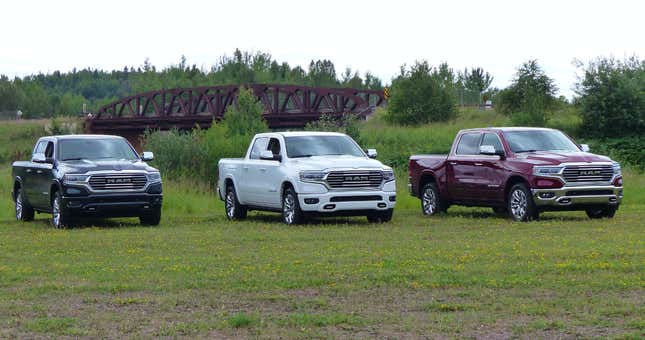
Jalopnik has reviewed the new “DT” generation Ram at least three times now, driving a 5.7-liter gas truck through the Arizona desert, towing a Mahindra Roxor with a bare-bones V8 model, and test-driving the mild-hybrid V6 and V8 trucks in Kentucky. The main takeaways, especially from the first and last story, are that the Ram is a damn good truck—easily among the best in the class overall.
Much of that is unchanged for the new EcoDiesel model, as it rides on the same bones, is outfitted the same way inside the cabin, and uses the same 8HP75 transmission as the V8 model. But the major difference is the engine.
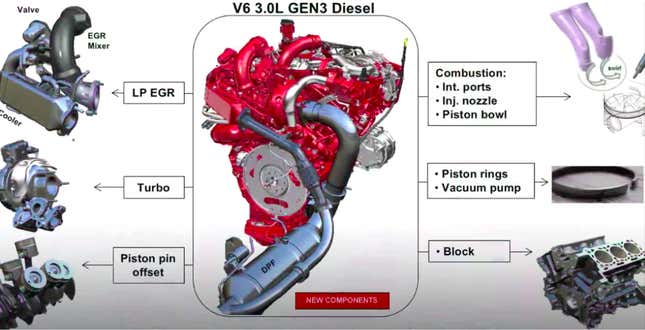
Compared to the last-generation 3.0-liter 60-degree V6 diesel, Ram says 80 percent of the latest mill’s parts are new, with the motor’s chief engineer Mauro Puglia highlighting a few major changes for 2020. The most important one involves exhaust gas recirculation, or EGR, which is a system that reduces NOx emissions by sending mostly-inert exhaust gas into the combustion chamber, reducing combustion temperatures.
For the new Ram, the third-generation EcoDiesel engine gets a low-pressure exhaust gas recirculation system. So, in addition to taking exhaust manifold gases and feeding them through a cooler and into the intake, as in the high pressure system, the new Ram pulls exhaust from after the diesel particulate filter and sends it through a cooler to the intake. The point, Ram says, is that instead of having to rob exhaust gases used to spool the turbocharger, the engine can snag exhaust post-turbo turbine—a setup that Ram says yields “improved fuel economy and lower oxides of nitrogen (NOx).”
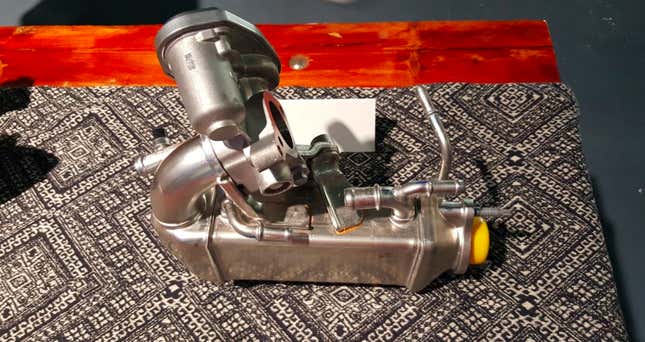
Here’s a look at the low-pressure EGR cooler that reduces the temperature of exhaust gases prior to sending them to the intake:
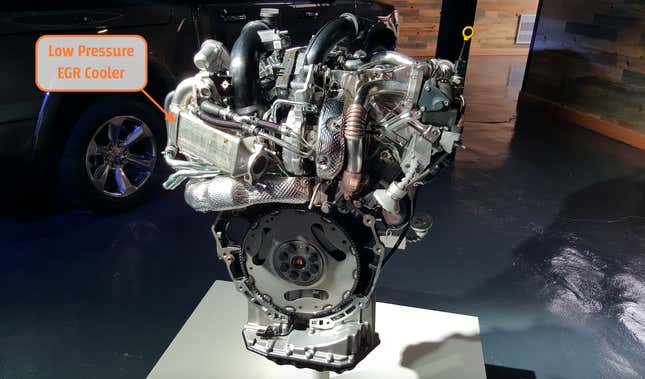
Other changes to the diesel engine include a new generation variable geometry turbocharger with allegedly lower friction bearings, promising better efficiency and response; redesigned intake ports for better airflow; a lower 16.0:1 compression ratio from 16:5, which Ram says helps reduce NOx; redesigned fuel injector nozzles; and updated bowls on the aluminum pistons, which have thinner rings and specially coated side skirts and wrist pins for reduced friction.
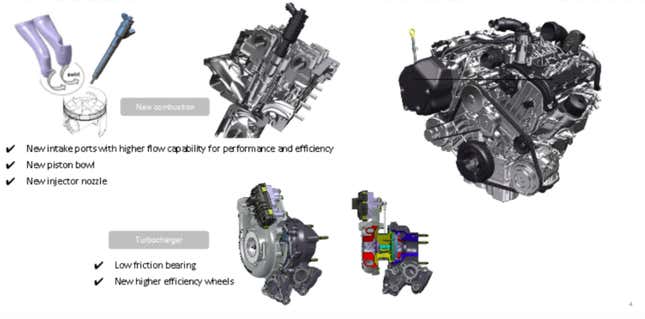
On the noise, vibration, and harshness front, Ram mentions that offsetting the wrist pin from the connecting rod centerline by a bit made a difference in reducing piston-slap, and the brand also says a two-piece sandwich material of polymer and metal for the oil sump apparently also helps with NVH.
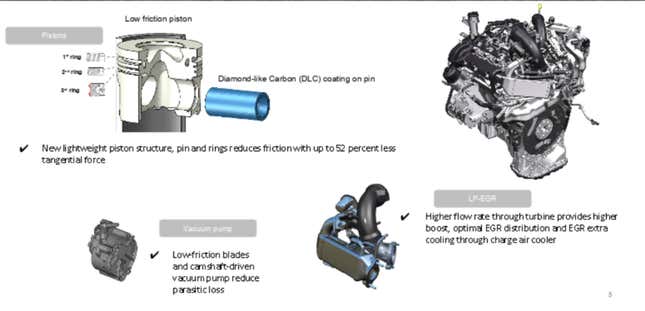
Other changes include a larger selective catalytic reduction system, less friction in the brake vacuum pump, and a change from a charge air cooler (or intercooler) that used to be mounted in front of the radiator to a “low slung CAC,” as the chief engineer Rod Romain put it. This means the air meant to cool the water in the radiator doesn’t have to pick up heat from the intercooler first, thus theoretically improving engine cooling performance.
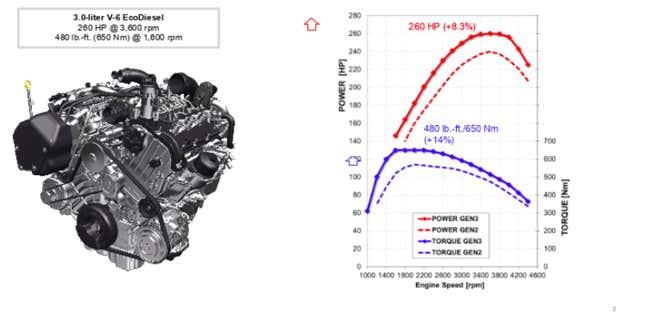
The Ferrara, Italy-built engine—which, like the outgoing model, contains a forged crank and rods, as well as a bed-plate to help handle stresses—now has a block that is reportedly 15 pounds lighter, though most importantly, the engine is more powerful and makes more torque across the rev range, per the output plot above.
Highway Driving In A Base Truck
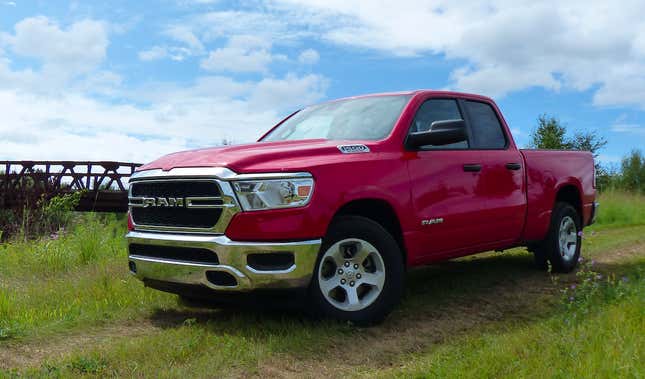
The first truck I drove was a Ram 1500 Tradesman Quad Cab 4x2. As outfitted, it was about $40,000 and came with two bench seats, a chrome front bumper, power heated mirrors, automatic headlamps, a tiny five-inch display, a trailer brake controller, a hitch, power windows and locks, cruise control, a tilt and telescoping steering wheel, air conditioning, and not a whole bunch else.
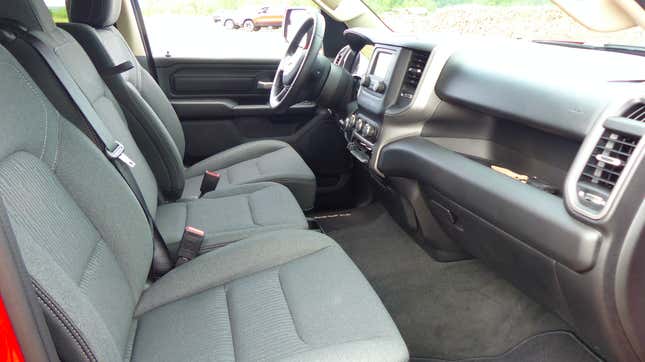
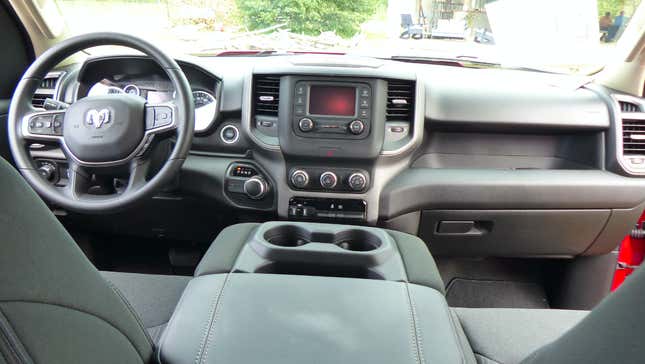
In some ways, it was a charming truck. The cloth bench seat with a folding center armrest was fantastically comfortable as my drive partner and I made our way down Minnesota’s remarkably poorly-maintained, pothole-ridden roads. The Ram’s coil-sprung suspension did a decent job of shrugging off the bumps; I wouldn’t say the ride was buttery smooth, but we were traversing a field of craters that would have left drivers of other trucks in a stretcher.

On the highway, the diesel engine was quiet and smooth, barely making itself noticed while cruising, during which a bit of wind noise from the front pillars seemed to dominate. Accelerating from a stop was a bit different, though, as the tell-tale sound of a compression engine made its way into the cabin, though it wasn’t that loud, and it was as smooth as any diesel I’ve ever heard.
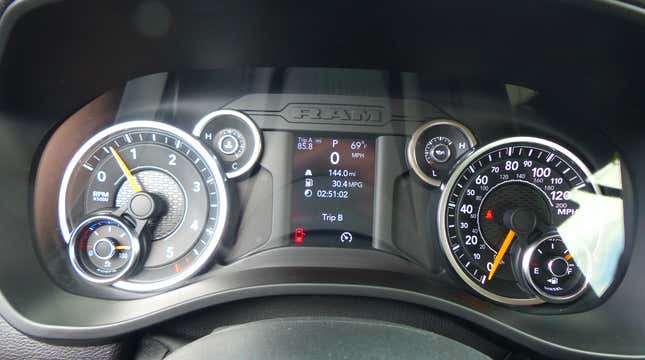
My drive partner and I decided we’d drive carefully to see what the truck could do on fuel economy, since Ram hadn’t given us any MPG numbers yet. There was a decent amount of elevation here and there, but for the most part, we gave our two-wheel drive, bare-bones Ram Tradesman some pretty good operating conditions under which to maximize fuel economy. We cruised at around 60 mph, and kept our pedal applications gradual, ending up with an average fuel economy computer readout right around 30.4 mpg over 150-ish miles.
Ram did tell journalists that the 1500 EcoDiesel can go from Duluth to Dallas on a single tank, and with a maximum tank size of 33 gallons, that equates to roughly 33 mpg. That’d be a six mpg highway step-up from the last-generation engine and truck, and would tie the vehicle with the Chevy Silverado, which seems like a hell of a tall order. We’ll see what number Ram ends up with, but the 30-ish mpg figure we saw on our short and crude test seemed decent, all things considered.
Off-Roading A Rebel
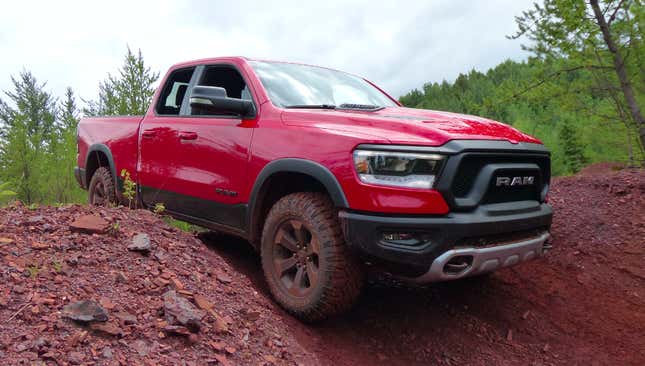
After our drive on the highway and on some back roads, we ended up at an off-road course, where Ram showed off what the diesel motor could do under the hood of some Ram Rebels. Like the gas version, the EcoDiesel-equipped Rebel comes with short 3.92 differential gear ratios, a locking rear diff, tow hooks, added ground clearance, skid plates, Bilstein shocks, and 33-inch Goodyear Wrangler DuraTrac all-terrain tires.
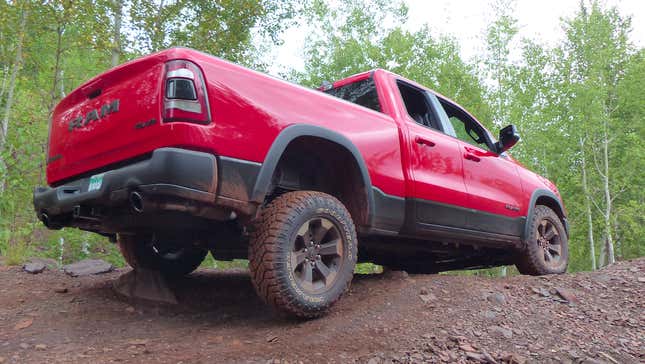
On the trails, the truck did well. Suspension articulation, particularly from the solid rear axle, was decent, and when it wasn’t, the rear locker kept the truck moving. It was clear that the engine had plenty of torque to, given the truck’s gearing, get over darn near any obstacle without breaking a sweat. I will say that despite the 2.64:1 transfer case, 3.92 axle ratio, and 4.71 first gear ratio (these result in a roughly 49:1 crawl ratio) and all the vehicle’s low-end torque, crawling slowly in the EcoDiesel Rebel wasn’t as easy as in something like a Wrangler Rubicon. In this area, the Rebel actually reminded me a bit of the diesel Colorado ZR2 in that slight applications of the throttle yielded a bit more “go” than I wanted. Strategic left-foot braking helped.
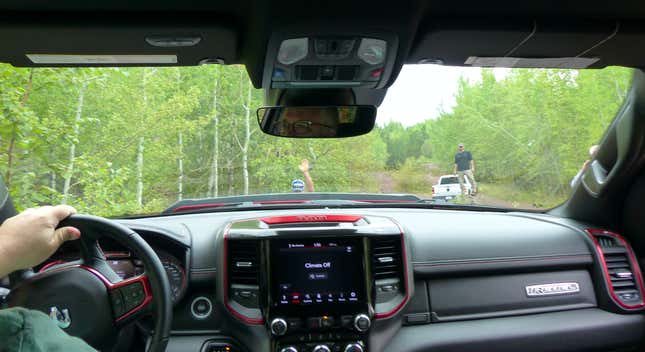
Another unsurprising pitfall of a full-size off-roader is its size. Snaking through wooded trails required focus, and visibility, especially up front, was limited, especially on hill-climbs. And while the latter is the case for any vehicle going up and over a steep crest, the Ram’s big hood doesn’t help, and I think front-facing camera like the one in the Jeep Gladiator would be a great addition to the Rebel’s off-road arsenal.
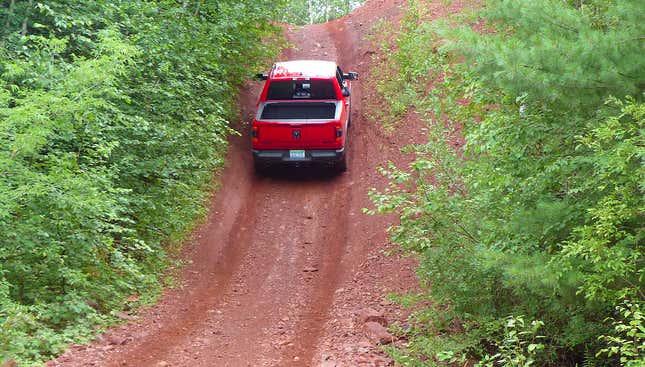
Ram had a pretty steep hill set up for journalists, and though it doesn’t look like much in the photo above, it was no joke, especially since things were wet. But with a bit of momentum, the truck ascended the grade, and the DuraTracs barely slipped at all. The truck did slow down a bit more than I’d expected near the top of the grade given my throttle application, but eventually it downshifted and went right over top. Shifting manually or just holding it into first probably would have made it a smoother ascent, but in either case, it was no trouble.
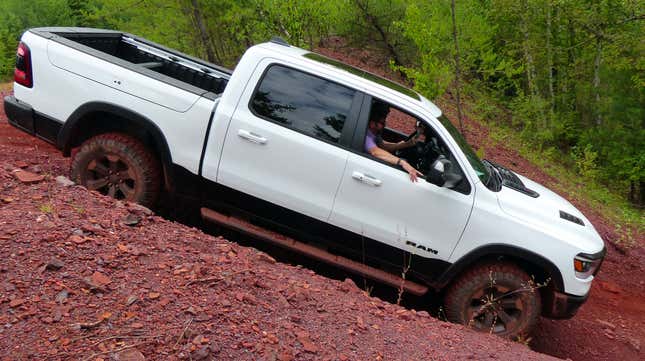
Downhill, the Rebel kicked ass, with a beautifully dialed-in hill descent control keeping the vehicle at a nice, steady pace.
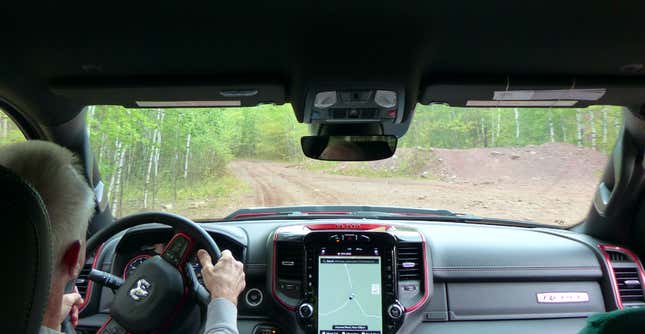
I have to admit that where the Ram Rebel impressed me most off-road was in high-speed trail driving. The Rebel is no Raptor, but my god does it do a solid job of making a rocky trail feel smooth at high speeds. The truck I drove had steel springs, and not the more expensive optional air suspension, and yet, when I hammered the throttle over reasonably large dips and craters, I winced to brace for harsh impacts, but they never came. The Rebel just floats.
Briefly Towing A Light Trailer, Driving A Limited Trim On-Road
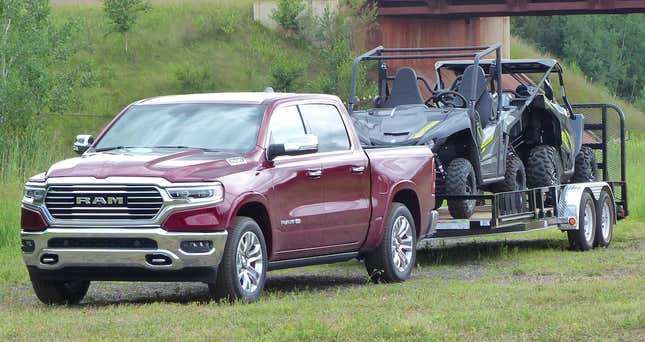
I also towed 5,000 pounds worth of trailer and side-by-sides, and it wasn’t a big deal for the motor. The truck is rated to tow 12,560 pounds, so this was easy work, with the diesel engine just chugging along. I won’t go so far as to say I didn’t notice the trailer, because the Ram did feel significantly slower, and with just 260 horsepower, it was far from quick. I’ll have to try the truck out with a heavier load, and over a longer distance to see if the diesel can manage OK fuel economy while towing—one of the many benefits of a diesel motor.
To be honest, I was a bit distracted during my test, because the interior of my tow rig absolutely spectacular.
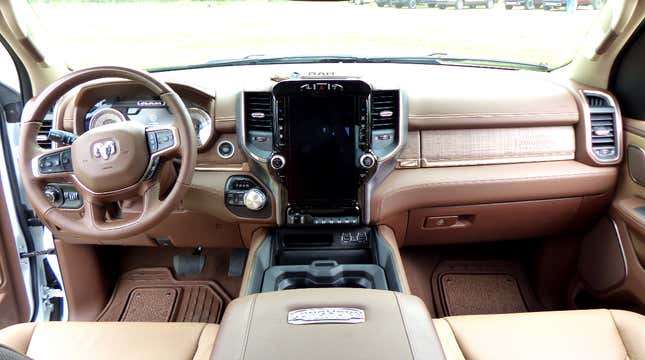
The picture above shows the interior of another white Longhorn edition Ram, but my tow truck’s innards looked largely the same, which is to say: Gorgeous. Granted, the white vehicle shown above, and probably my red tow vehicle, were roughly $70,000 trucks, but still. That’s possibly the nicest truck interior I’ve ever seen.
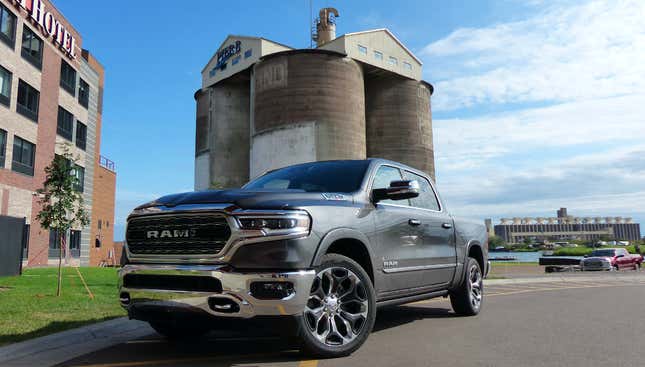
My journalist drive partner and I returned back to the hotel in a gray, roughly $70,000 Limited model, whose black interior was also beautiful, though somehow, my copilot and I agreed that the cloth bench seats felt a little softer and perhaps even a bit more comfortable overall. Still, there’s no arguing that, as much as I love a bare-bones truck, this Limited’s interior looks just better in every way:
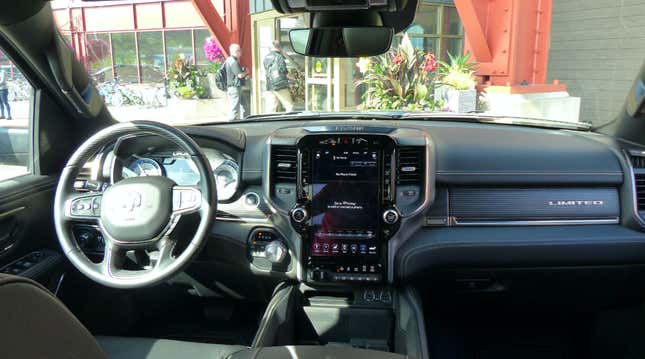
With maximizing fuel economy no longer on our minds, we hammered down on the gas to see how the 260 ponies would do in a mostly unladen luxury truck. And by “we,” I really mean “I,” because my passenger was feeling a bit under the weather and just wanted to cruise. I, however, had some acceleration testing to do, and to summarize the results, I’ll confirm that the EcoDiesel accelerates quickly enough to seriously piss off an ailing journalist.
It honestly felt quick from a stop, made some pretty nice turbo noises every now and then, offered decent throttle response, and could hold high gears when the road went uphill. The computer reading on the Limited truck was somewhere around 24 mpg, but again, I was letting it rip.
Early Verdict
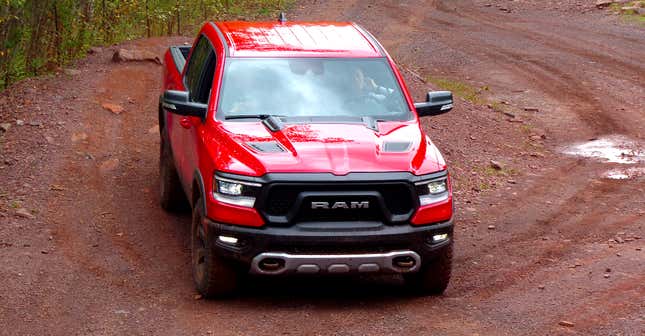
The results of this review aren’t really surprising, since the current gasoline and hybrid Ram 1500s are so solid. The EcoDiesel doesn’t change that at all, and in fact, with reasonably decent fuel economy based on my crude test, tons of torque, and a fairly refined demeanor, it’s got a lot to offer a nameplate that’s already, in many ways, at the head of the class.
The Ram EcoDiesel rated to tow up to 12,560 pounds, can haul over 2,000 pounds, and I confirmed it’ll do 30 mpg if you treat it right. That’s not bad.
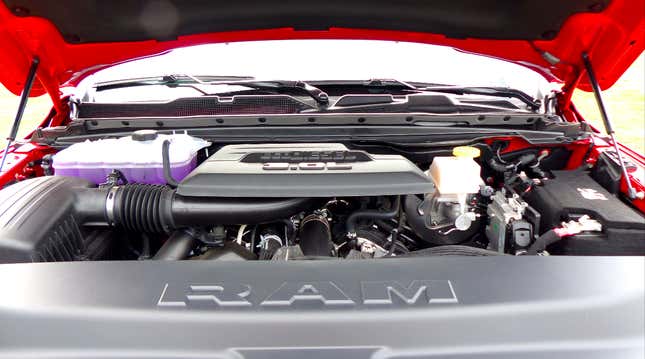
A big question mark is how the truck will do in fuel economy testing compared to the competition, but even without those figures, the diesel Ram feels like an extremely promising variant of one of the best half-ton trucks on the market. And it helps that it starts at a lower price than the diesel Ford F-150 and Chevy Silverado. Whether it’s worth the $3,000 to $4,995 over a gas Ram is something you’ll have to discuss with your truck gods, but I myself, as someone who likes to tow home new car projects, would be probably just go for it.